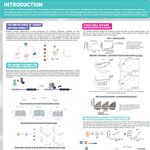
- The dynamics of DNA methylation as it relates to changes in gene expression, chromatin structure, and developmental status of the cells.
- The temporal relationship between 5mC, 5hmC, and chromatin accessibility dynamics at key regulatory regions to gain insight into molecular mechanisms that drive the differentiation cascade.
Utilizing duet multiomics solution evoC (duet evoC), Dr. Hodges will illustrate how the advanced technology provided a multidimensional view that allowed the team to investigate the correlation of methylation state and chromatin accessibility at specific sites across the genome.
Until recently, we have been measuring global 5hmC with limited success in identifying genomic locations of 5hmC at base pair resolution. With single-base resolution data, we will be able to precisely identify changes at individual gene enhancers, providing a detailed molecular understanding of how these changes impact gene regulatory programming.
-Dr. Emily Hodges
Dr. Hodges research specialty is DNA methylation and non-coding gene regulatory variation in evolution, development, and disease.
About duet evoC
The combinatorial genetic and epigenetic technology provides single-base-resolution sequencing data that reveals standard four-base sequencing (A, G, C, and T), and distinguishes between 5-methylcytosine (5mC) and 5-hydroxymethylcytosine (5hmC), on the same DNA molecule. This added resolution will allow greater power in detecting disease associations, identifying novel biomarkers, developing disease classifiers, and monitoring the progression of disease.
Sponsored By: Thermo Fisher Scientific
Please update your information
Certificate of Attendance
DOWNLOAD CERTIFICATE





